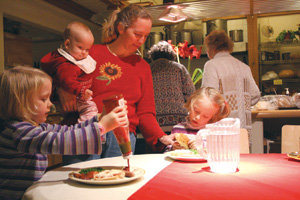Nearly five miles northwest of South Hill, Ithaca’s premier eco-community, EcoVillage, has been promoting sustainable living in the community and the classroom for the past 11 years. But this spring, Ithaca resident Henry Peterson will begin construction on White Hawk, a community in Danby that embraces EcoVillage-like ideals, but stands apart from its predecessor.

“Essentially, we’re going to simplify things and create a lot of our own resources,” Peterson said. “EcoVillage took a complicated avenue and we’re trying to avoid that.”
According to White Hawk’s vision statement, the community “envisions a place where people interact with each other on the land in positive and productive ways.” Rod Lambert, a consultant for White Hawk and EcoVillage’s development coordinator, said White Hawk plans to create a smaller, more affordable community of no more than 30 units.
“It represents a model of development that in fact a lot of people in the whole region would benefit from,” Lambert said.
Lambert said Peterson bought the land for the community three years ago and approached him about design and construction. Though he cannot estimate when the village will open, Lambert said he is anxious to establish White Hawk’s identity.
“We are looking forward to having our own atmosphere,” he said. “We will be devoting more land to agricultural purposes and replanting more forest in areas we feel they are needed.”
Lambert said EcoVillage’s farms are run under a system of Community Supported Agriculture (CSA), a system in which individuals run an independent farm and share an investment in the food production. While participation in CSA is optional in EcoVillage, White Hawk is hoping to have farms be a much bigger part of community life by requiring its members to work on the communal ground.
“As a part of White Hawk’s plan, they will emphasize elements of permaculture design,” he said.
Lambert also said White Hawk will not rely on municipal septic systems, but instead construct independent sewage treatments.
Steve Woinoski, an Albany resident, said he thinks EcoVillage has great ideals, but plans to live in White Hawk because of its stress on independent agriculture and individualized space.
“My fiancée and I had talked about where we wanted to live, and considered Ithaca for its community atmosphere and natural beauty,” he said. “After we read about eco-communities in the region, specifically White Hawk, we fell in love with the location.”
Junior Jack Haurin, president of the Ithaca College Environmental Society (ICES), said he is excited to have another eco-community in the area and hopes the greater community can take and incorporate sustainable practices from these eco-communities into their daily lives.
“[The eco-communities] do a lot in helping us re-realize the importance of understanding where our food comes from, who produces it and what it means to eat it,” he said.
EcoVillage works with the college’s environmental studies program, sending members of EcoVillage to campus to oversee independent study projects and teach courses, including two classes last semester. Lambert said because of White Hawk’s location, it would be ideal to work with the college on projects — similar to EcoVillage’s partnership.
“[White Hawk and EcoVillage] are striving toward the same goals. Hopefully it will be a mainstream dream,” Lambert said. “[White Hawk] would be very happy to form a collaboration with Ithaca College.”
A sustainability educational workshop, sponsored by the EcoVillage partnership, was held yesterday in Clark Lounge to educate faculty, staff and students about sustainable living. The program was created by The Cloud Institute, a national organization that teaches sustainability in college and K-12 classrooms through hands-on workshops for educators.
The morning session, “The Fishing Game,” was an interactive simulation combining systems of thinking tools, ecological systems and economics, to demonstrate ways to apply sustainability in the classroom. The afternoon workshop, “Education for Sustainability,” targeted critical thinking and problem-solving skills, and addressed real issues of sustainability and viable solutions.
Susan Allen-Gil, associate professor of biology and a participant in the workshop, said the activities were not only important for faculty, but also for the entire college community.
“The content from The Cloud Institute promises some very concrete ideas of how to teach sustainability,” Allen-Gil said. “It is important for the college community to continue dialogue and work together. The workshop has helped educators close the gap between them and students.”
Allen-Gil said it is important for professors to be competent in teaching sustainability because they are teaching concepts to future leaders.
“The majority of the student population have heard of sustainability but don’t consider it a serious concern for them,” she said. “[Faculty] are going to be passing the information to students who are going to inherit this world, and right now it’s not a pretty place.”
Woinoski said living in sustainable communities like White Hawk is a step in the right direction.
“In America we waste our most valuable resources without thinking twice about where the energy is wasted,” Woinoski said. “Living in an ecological community lessens the impact.”







